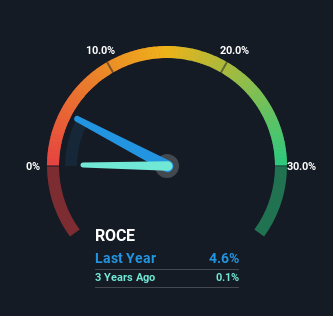Burger Fuel Group's (NZSE:BFG) Returns On Capital Are Heading Higher
If you're not sure where to start when looking for the next multi-bagger, there are a few key trends you should keep an eye out for. Firstly, we'll want to see a proven return on capital employed (ROCE) that is increasing, and secondly, an expanding base of capital employed. Basically this means that a company has profitable initiatives that it can continue to reinvest in, which is a trait of a compounding machine. With that in mind, we've noticed some promising trends at Burger Fuel Group (NZSE:BFG) so let's look a bit deeper.
What Is Return On Capital Employed (ROCE)?
For those who don't know, ROCE is a measure of a company's yearly pre-tax profit (its return), relative to the capital employed in the business. Analysts use this formula to calculate it for Burger Fuel Group:
Return on Capital Employed = Earnings Before Interest and Tax (EBIT) ÷ (Total Assets - Current Liabilities)
0.046 = NZ$1.6m ÷ (NZ$39m - NZ$4.9m) (Based on the trailing twelve months to September 2023).
So, Burger Fuel Group has an ROCE of 4.6%. Ultimately, that's a low return and it under-performs the Hospitality industry average of 6.4%.
Check out our latest analysis for Burger Fuel Group
Historical performance is a great place to start when researching a stock so above you can see the gauge for Burger Fuel Group's ROCE against it's prior returns. If you're interested in investigating Burger Fuel Group's past further, check out this free graph of past earnings, revenue and cash flow.
What Can We Tell From Burger Fuel Group's ROCE Trend?
Even though ROCE is still low in absolute terms, it's good to see it's heading in the right direction. The numbers show that in the last five years, the returns generated on capital employed have grown considerably to 4.6%. The company is effectively making more money per dollar of capital used, and it's worth noting that the amount of capital has increased too, by 240%. So we're very much inspired by what we're seeing at Burger Fuel Group thanks to its ability to profitably reinvest capital.
On a related note, the company's ratio of current liabilities to total assets has decreased to 12%, which basically reduces it's funding from the likes of short-term creditors or suppliers. Therefore we can rest assured that the growth in ROCE is a result of the business' fundamental improvements, rather than a cooking class featuring this company's books.
The Bottom Line
To sum it up, Burger Fuel Group has proven it can reinvest in the business and generate higher returns on that capital employed, which is terrific. Astute investors may have an opportunity here because the stock has declined 51% in the last five years. So researching this company further and determining whether or not these trends will continue seems justified.
On a final note, we've found 2 warning signs for Burger Fuel Group that we think you should be aware of.
While Burger Fuel Group isn't earning the highest return, check out this free list of companies that are earning high returns on equity with solid balance sheets.
Have feedback on this article? Concerned about the content? Get in touch with us directly. Alternatively, email editorial-team (at) simplywallst.com.
This article by Simply Wall St is general in nature. We provide commentary based on historical data and analyst forecasts only using an unbiased methodology and our articles are not intended to be financial advice. It does not constitute a recommendation to buy or sell any stock, and does not take account of your objectives, or your financial situation. We aim to bring you long-term focused analysis driven by fundamental data. Note that our analysis may not factor in the latest price-sensitive company announcements or qualitative material. Simply Wall St has no position in any stocks mentioned.

 Yahoo Finance
Yahoo Finance 
